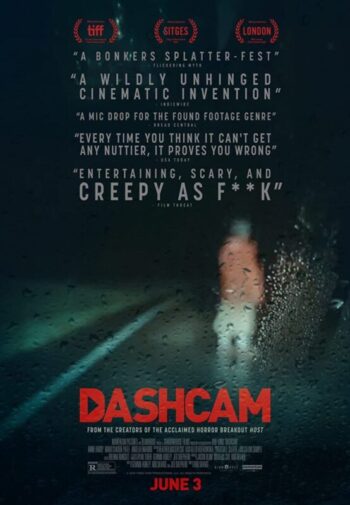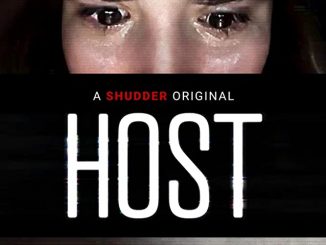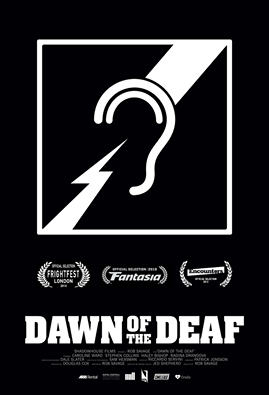(2021)
Directed by: Rob Savage
Written by: Gemma Hurley, Jed Shepherd, Rob Savage
Starring: Amar Chadha-Patel, Angela Enahoro, Annie Hardy

DASHCAM
Directed by Rob Savage
Depending on how well you know horror, you’ll either have heard of Dashcam as the film Vue almost certainly didn’t try to ban or the sophomore outing for director Rob Savage. Like his feature debut Host, this is a found footage – written with returning writers Gemma Hurley and Jed Shepherd. Only where it was a Zoom call, this time we’re going out into the world with a streaming show named BandCar: The Internet’s #1 Live Improvised Music Show Broadcast from a Moving Vehicle. In it, the host Annie Hardy, a real performer playing an alt-right version of herself, riffs on suggestions made by her viewers. Generally, this takes the form of rapping lude one-liners and anti-liberal sentiments.
So she’s anti-mask, anti-BLM and pro-Trump, i.e., not your average final girl. With the pandemic restrictions in her native LA getting worse, she decides to hop on a flight to London and surprise her former bandmate Stretch. Although he’s initially hyped to see her, at least after a rude awakening, it’s pretty clear he isn’t who he used to be. He’s packed in their debauch days on the road for a committed relationship, vegetarian food and a delivery job. There are also tensions from the start between Annie and his girlfriend Gemma – they disagree over politics, Covid-19, personal space and everything else that comes up. So it’s no surprise she wants Stretch to make her leave. But, before she can be given the boot, Annie nicks their car and goes to get some food by fulfilling an order. Only this takes her to an odd café where the owner seems on edge and asks her to escort an elderly lady home. Sounds easy enough, right?
As per Host, Savage is interested in using modern tech to tell his story. In this case, the live stream format allows Dashcam to construct a whole digital ecosystem. For most of the film, the left side of the screen is given over to a barrage of comments. Some are funny, some filthy, some offensive – but all are realistic. We have emoticons floating up along the right – laughter, love, disgust, etc. It may sound a lot, but I never felt overwhelmed, and it gives even the more outlandish bits more credibility. It also guarantees you’ll watch it twice, assuming you like it, as there’ll be all sorts of gags you miss the first time. It’s a surprisingly funny film, albeit never subtly – we have a graphic sequence involving human excrement that may be too much for some people and constant incest jokes. However, against my better judgment, I frequently laughed at Annie’s constant poetic profanities and her generally being an asshole.
Maybe Dashcam’s biggest achievement is in just how well it creates a character that you can’t stand, then turning the things you hate most about her into strengths. Hardy, or at least this fictional version of her, is a horrible person – plain and simple. She’s bigoted, loud, obnoxious, dishonest and has no respect for other people’s boundaries. Even putting her reactionary politics aside, picture an amalgamation of your least favourite traits in a person, and you’re close. So, it’s a testament to how well Savage, the writers and Hardy herself commit to the bit that I wanted to spend more time in her presence by the end. So often, with this sort of character, the temptation is to lean heavily on parody, making them believe in lizard-people and microchips, or go the other way and force pathos. Neither happens here – it’s more challenging than that. As an audience, we’re asked to unapologetically accept her for who she is.
This isn’t to say there’s no nuance. Hardy finds hidden layers, occasionally letting down her guard to give us glimpses of vulnerability. If there’s an emotional centre heart to the film, it’s her unhealthy friendship with Stretch. He is on the cusp of moving on, having outgrown her schtick and having completely different priorities. However, there’s enough goodwill there that he hasn’t entirely written her off, no matter how much Gemma thinks he should have. It’s unexpectedly poignant to see them still trying to rap together when things are at their worst. There’s also an improvised edge to it, with the team working from a treatment vs a full script, which works in its favour – making the exchanges sound (for the most part) organic. These are two actors who know their roles well and their dysfunctional relationship. Unfortunately, while the two-person focus works from a character perspective, it also means we don’t fully believe they are in danger.
Like Host, Dashcam may be a slow build-up, but the second half is a relentless series of set-pieces and scares as we lurch from one shit situation to another. There are ome excellent locations this time, including an abandoned theme park and better gore. However, where the former had a relatively large cast to off, this one is mostly just two characters. And without giving anything away, we assume at least one of them must be carrying the camera up until the last act. As such, the plot armour means a lot of the time we hear a loud noise, see the camera fall, see it be picked up, and then run on to the next jump moment. Granted, this is true of found footage films more broadly – or at least the chase heavier ones. And at least this one gets around the issue of why the camera is always on. Still, it soon starts to feel formulaic for a film that’s barely an hour (on that point, the credits are long but totally worth watching). It doesn’t help that, once again, the threat isn’t very concrete. I expect this was intentional, so we’re forced to side with Hardy since we’re as lost as she is. I wanted to know more about what was going on, or at least the scale of the problem – the most we get is what seems to be a recurring Ariana Grande tattoo. Without that worldbuilding, we lose what can often make a horror truly memorable: the baddy. There’s an enjoyable irony to a little old lady being responsible – ok, as well as Hardy’s many terrible decisions. But she never feels fully realised – existing more as a concept than a character. There’s also a sense of anti-climax when the thrill ride grinds to a halt, though the film leans into that quite well.
Still, it’s worth emphasising I was never bored. Whenever I thought I’d gotten a grip on Dashcam or reached a lull, Savage slows things down to deliver a creepy, quieter bit. Like a mask getting bloodied from the inside or a figure gliding into shape. Then moments later the shit hits the fans again. There’s an excellent rhythm to the individual scenes and the movie in general. They’re impeccably crafted. Is it better than Host? Probably not. But it isn’t a wonderufl comparison: Dashcam is a very different, and a much riskier proposition. People often discuss found footage as a genre unto itself, which it isn’t – it’s a storytelling technique. And in two movies, Savage has shown its range. I’m loathed to give this one a star rating, as it won’t mean much. I know for some it’ll be the full five – especially if they have a wicked sense of humour. Yet many, potentially most, won’t make it past the immediately unlikeable protagonist – and that’s too bad. For those that do, or like the film despite her, it’s a hell of a ride.
Dashcam is available for VOD.





Be the first to comment